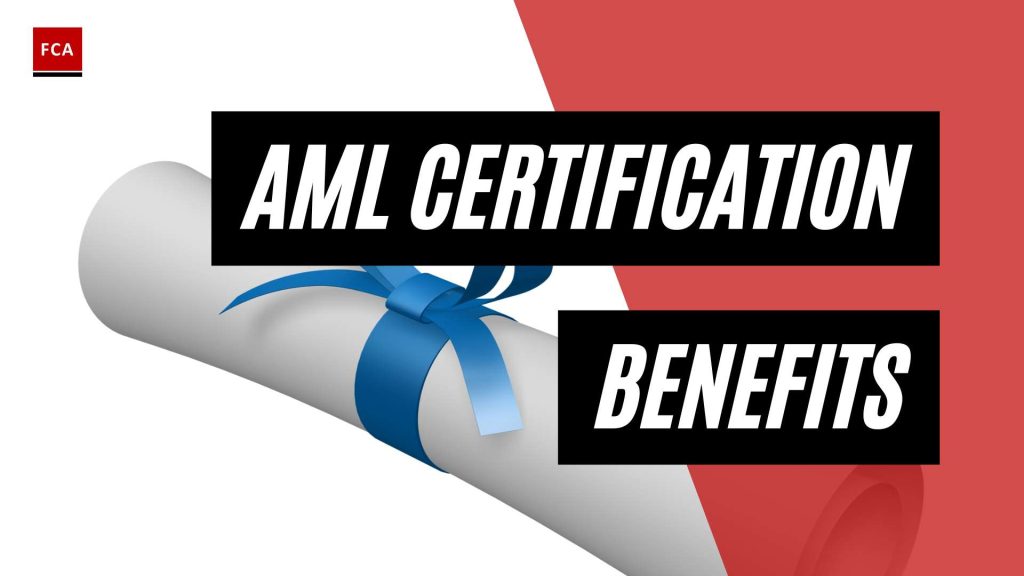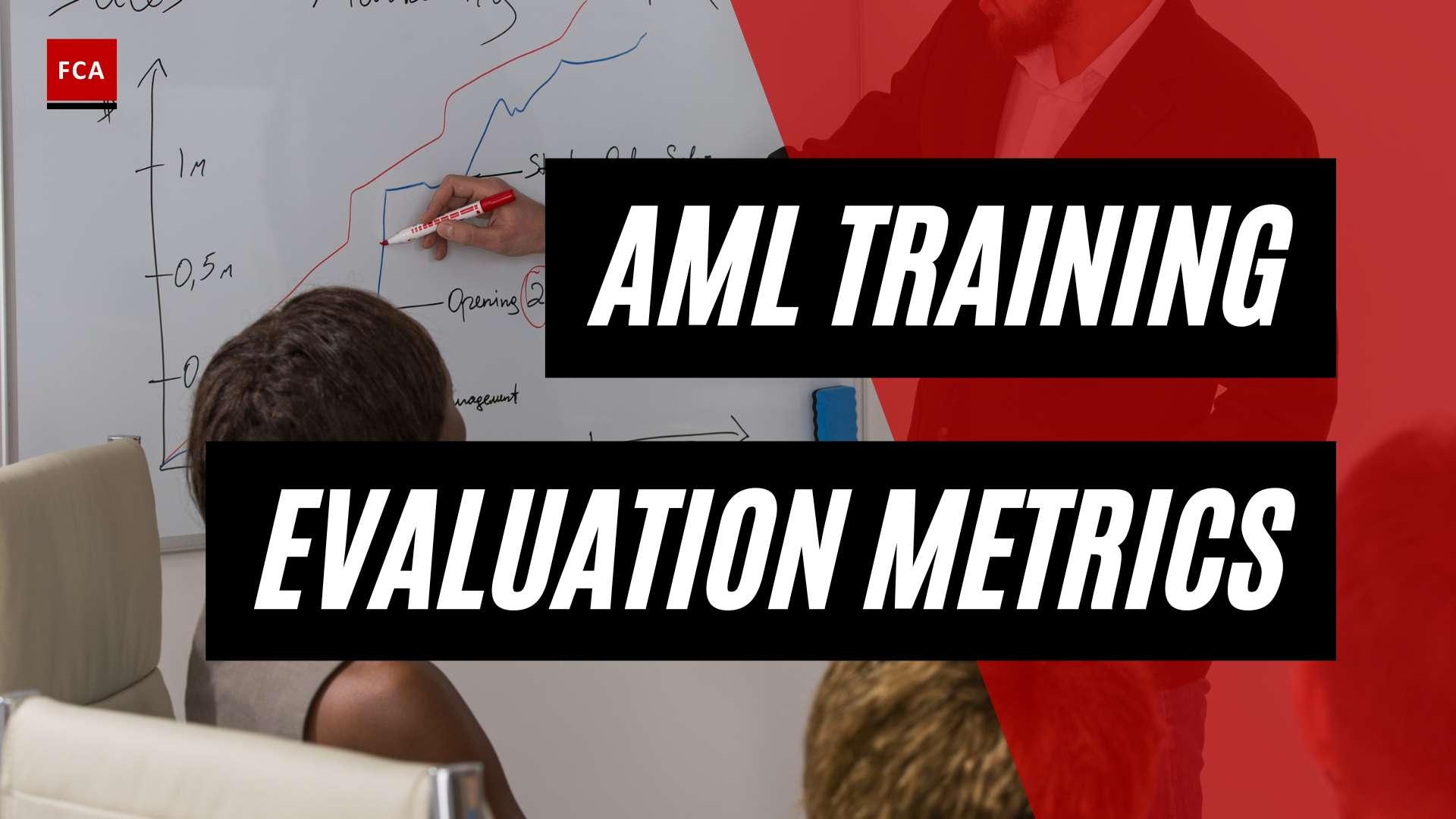AML Certification: Advancing Your Career
Obtaining an AML certification is a significant step towards advancing your career in the field of anti-money laundering. This certification holds immense importance in the industry and offers numerous benefits to professionals working in compliance, risk management, anti-money laundering, and anti-financial crime roles.
The Importance of AML Certification
AML certifications have become essential for individuals seeking to excel in the world of anti-money laundering. These certifications equip professionals with the necessary expertise and knowledge to address the increasing speed of financial crimes that undermine the global economy (Dumpsgate). By obtaining an AML certification, you demonstrate your commitment to ethical business practices and your adherence to regulations, enhancing your professional credibility and reputation in the financial industry (New Age Learning).
Moreover, AML certification training equips individuals with the necessary skills to detect and prevent financial crimes. In today’s regulatory environment, this knowledge is critical to ensure compliance with anti-money laundering laws and regulations (New Age Learning). Holding an AML certification showcases your expertise in identifying and mitigating the risks associated with money laundering activities, making you an invaluable asset to organizations combating financial crimes.
Benefits of AML Certification
There are numerous benefits to obtaining an AML certification. First and foremost, AML certifications open the door to a wide range of career opportunities in different sectors, such as banks, insurance companies, casinos, law firms, or even governments. These sectors require professionals who can effectively combat money laundering activities and other financial crimes (New Age Learning). This breadth of opportunities allows you to explore various avenues and find a career path that aligns with your interests and goals.
Holding an AML certification also increases your chances of landing jobs that offer competitive salaries. The demand for AML professionals across various industries is high, and organizations are willing to offer attractive compensation packages to attract and retain certified individuals (New Age Learning). In the U.S., AML specialists earn a median salary of $70,700 per year, with top earners making up to $111,000 annually (Indeed).
Furthermore, AML certifications are recognized globally, providing professionals with a competitive edge in the job market and increasing their chances of employability both domestically and internationally (New Age Learning). By earning an AML certification, you demonstrate your dedication to enhancing your knowledge and skills in the field, making you a sought-after candidate for AML analyst, investigator, and compliance officer roles, among others (Indeed). Employers value the specialized skills and expertise that come with AML certification, which can result in better job security and increased opportunities for career growth.
In conclusion, obtaining an AML certification is a significant step towards advancing your career in the field of anti-money laundering. It showcases your commitment to upholding ethical business practices, enhances your professional reputation, and opens the door to a wide range of job opportunities with competitive salaries. By acquiring specialized knowledge and skills in detecting and preventing financial crimes, you position yourself as a valuable asset in the fight against money laundering and illicit financial activities.
Recognizing the CAMP Certification
The CAMP certification signifies a professional’s comprehensive knowledge of AML principles, regulations, and best practices. It demonstrates their commitment to staying updated with the evolving landscape of financial crime prevention. Holding a CAMP certification can open doors to various career opportunities in risk management, compliance, and AML operations globally.
Employers increasingly seek certified individuals for key roles in financial institutions, regulatory agencies, and other organizations involved in combating money laundering and terrorist financing. The CAMP certification is highly regarded in the industry, indicating a professional’s dedication to maintaining the highest standards of compliance and anti-money laundering practices.
Earning Potential with Certification
Obtaining a certification can positively impact earning potential for professionals in the financial crime prevention field.
The value placed on the certification by employers translates into higher salaries, bonuses, and opportunities for career advancement. With the increasing demand for professionals well-versed in AML compliance, holding a certification can give individuals a competitive edge in the job market.
By investing in certification, professionals demonstrate their dedication to excellence and professionalism in the AML field. This prestigious certification not only enhances their credibility and trustworthiness among peers, clients, and employers but also underscores their commitment to combatting financial crime and maintaining the integrity of the global financial system.
To learn more about the process, requirements, and benefits of obtaining AML certification, you can explore our article on aml certification courses.
Job Opportunities with AML Certification
Obtaining an AML certification not only enhances your knowledge and skills in the field of anti-money laundering but also opens up a world of job opportunities and career advancement. As the demand for skilled professionals in compliance, risk management, and anti-financial crime continues to rise, having an AML certification can give you a competitive edge in the job market.
AML Roles and Career Pathways
With an AML certification, you can pursue various roles within the field of anti-money laundering. These roles encompass a wide range of responsibilities, including detecting and preventing money laundering activities, ensuring compliance with regulations, conducting risk assessments, and implementing effective AML programs.
Some common AML roles include:
- AML Analyst: AML analysts play a crucial role in identifying suspicious activities, conducting investigations, and filing reports to regulatory authorities. They analyze financial transactions, monitor customer accounts, and implement AML policies and procedures.
- AML Compliance Officer: AML compliance officers are responsible for ensuring that financial institutions and organizations adhere to AML laws and regulations. They develop and implement compliance programs, conduct audits, and provide training to employees on AML practices.
- AML Investigator: AML investigators are responsible for conducting in-depth investigations into suspicious transactions and activities. They gather evidence, analyze data, and collaborate with law enforcement agencies to combat money laundering and financial crimes.
- AML Manager: AML managers oversee the implementation of AML programs and policies within an organization. They develop strategies to mitigate risks, monitor compliance, and ensure the effectiveness of AML controls.
These are just a few examples of the many roles available to AML-certified professionals. Depending on your experience, education, and certification level, you can explore various career pathways and advance your career in the anti-money laundering field.
Increasing Demand for Certified Professionals
The demand for AML-certified professionals is on the rise, both globally and across industries. Financial institutions, regulatory bodies, and other organizations are actively seeking individuals with AML certifications to strengthen their compliance efforts and combat money laundering and financial crimes.
Certified professionals often have higher earning potential compared to their non-certified counterparts. In the United States, certified professional can result in potential earnings of up to 35% more than non-certified professionals in similar roles. This indicates the value placed on AML certification by employers and the potential for career growth and financial rewards.
Furthermore, holding an AML certification can lead to increased job opportunities within the financial crime compliance and anti-money laundering fields globally. Employers recognize the expertise and knowledge that comes with AML certification, making certified professionals highly sought after. The certification demonstrates your commitment to staying updated on industry best practices and your dedication to combating financial crimes.
As the fight against money laundering intensifies and regulatory requirements become more stringent, the demand for certified AML professionals will continue to grow. By obtaining an AML certification, you position yourself for a successful and rewarding career in a field that plays a critical role in maintaining the integrity of the financial system.
To learn more about AML certification, including the certification process, requirements, and training programs, visit our article on aml certification programs.
Enhancing Professional Reputation
Obtaining an AML certification can significantly enhance an individual’s professional reputation within the industry. AML certifications, such as the CAMP certification, demonstrate a commitment to the highest standards of compliance and anti-money laundering practices, instilling credibility and trust among peers, clients, and employers. Let’s explore the specific benefits that contribute to enhancing professional reputation.
Credibility and Trust in the Industry
By earning an AML certification, professionals showcase their dedication to excellence and professionalism in the field of anti-money laundering. This certification serves as a testament to their competence in anti-money laundering practices and regulations, fostering credibility among colleagues and industry stakeholders. Employers and clients value individuals who possess an AML certification, as it signifies a commitment to ethical business practices and adherence to regulations.
Certified professionals are seen as knowledgeable and trustworthy resources within their organizations. Their expertise in anti-money laundering procedures and risk management instills confidence in their ability to identify and mitigate potential risks. This increased credibility can open doors to new opportunities and career advancement within the industry.
Commitment to Compliance and AML Practices
Obtaining an AML certification demonstrates an individual’s commitment to upholding the highest standards of compliance. It signifies a dedication to staying updated on evolving regulatory requirements and industry best practices. By investing time and effort in obtaining this certification, professionals showcase their proactive approach to combating money laundering and financial crimes.
Employers value individuals with AML certifications because they understand that these professionals possess a deep understanding of AML regulations and can effectively implement compliance measures. Certified individuals are more likely to be entrusted with critical responsibilities related to risk assessment, due diligence, and regulatory compliance.
By enhancing their professional reputation through AML certification, individuals can position themselves as leaders in the field of anti-money laundering. They gain recognition for their commitment to ethical practices and their ability to navigate the complex landscape of financial crime prevention.
Remember to explore the specific AML certification benefits offered by different AML certification programs. These benefits may include advanced risk assessment capabilities, secure identity verification processes, and compliance with global sanction lists, all of which contribute to enhancing professional reputation and trust within the industry.
Knowledge and Skills with AML Certification
Obtaining an AML certification not only validates your expertise in anti-money laundering practices but also equips you with valuable knowledge and skills to excel in your career. Let’s explore two key areas where AML certification enhances your capabilities: a deeper understanding of money laundering and risk assessment and regulatory compliance.
Deeper Understanding of Money Laundering
AML certification provides individuals with a deeper understanding of money laundering techniques, enabling them to effectively identify and combat illicit financial activities within organizations. Through comprehensive training and education, professionals gain insights into the various methods and stages of money laundering, including placement, layering, and integration.
This enhanced understanding of money laundering allows certified professionals to detect suspicious transactions, patterns, and behaviors more efficiently. By recognizing red flags and indicators of potential money laundering, they can take proactive measures to prevent financial crimes and protect organizations from reputational and regulatory risks.
Risk Assessment and Regulatory Compliance
AML certification training equips individuals with the necessary skills to perform risk assessments and ensure compliance with anti-money laundering laws and regulations. Professionals learn about the compliance frameworks, reporting obligations, and regulatory requirements that govern financial institutions and other entities susceptible to money laundering (New Age Learning).
By developing expertise in risk assessment methodologies, certified professionals can identify vulnerabilities and weaknesses within organizations’ systems and processes. They can then implement robust anti-money laundering controls and procedures to mitigate these risks effectively. Additionally, AML certification equips individuals with knowledge of relevant laws and regulations, enabling them to navigate the complex compliance landscape and ensure adherence to regulatory guidelines.
With the ever-evolving nature of financial crimes, staying updated on the latest trends, techniques, and regulatory changes is crucial. AML certification programs provide professionals with ongoing education and opportunities for continuous professional development. This ensures that certified individuals remain knowledgeable and equipped to tackle emerging challenges in the field of anti-money laundering.
By deepening your understanding of money laundering and honing your risk assessment and regulatory compliance skills through AML certification, you position yourself as a highly competent professional in the fight against financial crimes. This not only enhances your career prospects but also contributes to the overall integrity and stability of the global financial system.
Compliance and AML Certification
In the realm of anti-money laundering (AML), achieving AML certification is vital for professionals working in compliance, risk management, and anti-financial crime roles. AML certification helps organizations meet regulatory requirements, reduce financial crime risks, and improve overall compliance standards (Financial Crime Academy). This certification ensures that businesses adhere to anti-money laundering laws and regulations, avoiding penalties and reputational damage.
Meeting Regulatory Requirements
AML certification plays a crucial role in helping organizations meet regulatory requirements. Governments and regulatory bodies have established stringent rules and regulations to combat money laundering and terrorist financing. For instance, in the United States, the Bank Secrecy Act (BSA) was the first anti-money laundering legislation established in 1970 to identify and prevent money laundering (Dumpsgate). Since then, the regulatory landscape has evolved, with new regulations and changes introduced to strengthen anti-money laundering efforts.
On a global scale, organizations need to adhere to the standards set by the Financial Action Task Force (FATF), an international organization that develops and promotes anti-money laundering standards worldwide. Additionally, institutions may need to comply with regional regulations, such as those established by the European Union to prevent money laundering within its financial systems (Dumpsgate).
By obtaining AML certification, professionals demonstrate their competence and knowledge in the field, ensuring that organizations are equipped to meet these regulatory requirements.
Improving Compliance Standards
AML certification not only aids in meeting regulatory requirements but also helps enhance compliance standards within organizations. The certification process equips professionals with the skills and knowledge necessary to effectively identify and prevent financial crimes, such as tax fraud, corruption, money laundering, and illicit trade. By staying updated with industry best practices, certified professionals contribute to the development and improvement of compliance standards within their organizations.
Certified professionals possess a deeper understanding of money laundering techniques, risk assessment, and regulatory compliance. This knowledge enables them to implement robust AML programs, conduct thorough investigations, and develop effective strategies to minimize financial crime risks. Through their expertise, they help prevent criminals from injecting illegal funds into the financial system, reducing criminal activities worldwide.
By investing in AML certification, professionals demonstrate their commitment to upholding high compliance standards, ensuring the integrity and security of financial systems.
Meeting regulatory requirements and improving compliance standards are fundamental aspects of AML certification. By obtaining this certification, professionals not only gain a competitive edge in the AML career field but also contribute to the fight against financial crime. The knowledge and skills acquired through AML certification enable professionals to play a crucial role in safeguarding the financial industry and protecting organizations from the risks associated with money laundering.
AML Certification in Financial Institutions
Financial institutions, particularly those in the investment banking sector, play a critical role in combating money laundering and other financial crimes. Due to the high volume of financial transactions involved, investment banking is subject to strict anti-money laundering (AML) regulations. Let’s explore the significance of AML in investment banking and the regulations and prevention processes involved.
AML in Investment Banking
Investment banking is a highly regulated industry, and AML regulations are particularly strict in this area due to the high volume of financial transactions that occur. Financial institutions operating in the investment banking sector are expected to have a comprehensive AML program in place. This program includes policies, procedures, and controls to prevent, detect, and report suspicious activity (LinkedIn).
To comply with AML regulations, investment banks must implement robust measures to identify and mitigate the risk of money laundering and terrorist financing. These measures include conducting customer due diligence (CDD) to verify the identity of customers, understand their business nature, and assess the risk associated with their transactions. Enhanced due diligence (EDD) is performed for high-risk customers or transactions, requiring additional information such as the source of funds (LinkedIn).
AML Regulations and Prevention Process
AML regulations in investment banking are enforced by financial regulators such as the Financial Action Task Force (FATF) or the Financial Crimes Enforcement Network (FinCEN) in the United States. These regulators require financial institutions to implement a set of measures, policies, and procedures to detect and prevent money laundering activities. The goal is to protect the integrity of the financial system and prevent illicit funds from being used for illegal purposes (LinkedIn).
The AML prevention process in investment banking typically involves:
- Customer Due Diligence (CDD): Financial institutions are required to verify the identity of their customers, understand their business activities, and assess the risk of money laundering or terrorist financing. Accurate customer information must be collected and maintained to ensure compliance with regulatory requirements.
- Enhanced Due Diligence (EDD): For high-risk customers or transactions, financial institutions must perform enhanced due diligence. This involves collecting additional information, such as the source of funds, to identify and assess risks associated with high-risk scenarios.
By implementing effective AML policies, procedures, and controls, investment banks can mitigate the risk of financial crimes, protect their reputation, and ensure compliance with regulatory requirements. This, in turn, helps to reduce the potential for legal and reputational damage, fines, and penalties.
Understanding the regulations and prevention processes involved in AML is essential for professionals working in compliance, risk management, and anti-money laundering roles within financial institutions. AML certification provides individuals with the knowledge and skills necessary to navigate the complex landscape of AML regulations and contribute to the effective implementation of AML programs in investment banking.
Building a Successful Career in AML
To establish a successful career in anti-money laundering (AML), professionals should focus on acquiring the necessary certifications and education, as well as gaining practical experience and networking within the industry.
Certifications and Education
Pursuing relevant certifications and education is essential for building a career in compliance, AML, and counter-fraud. These certifications provide valuable knowledge and skills to enhance understanding and capabilities in these areas. For individuals interested in AML, the Certified Anti-Money Laundering Professional (CAMP) certification is widely recognized and respected in the field.
By completing AML certification courses, professionals can deepen their understanding of AML regulations, risk management, and detection techniques. These courses cover topics such as transaction monitoring, customer due diligence, and suspicious activity reporting. Additionally, pursuing higher education in related fields like law, accounting, or finance can significantly enhance one’s understanding and capabilities in compliance, AML, and counter-fraud.
Practical Experience and Networking
Gaining practical experience through internships and entry-level positions within financial institutions is crucial for establishing a successful career in compliance, AML, and counter-fraud. These opportunities offer valuable hands-on experience and expose individuals to the complexities of these fields, setting a solid foundation for professional growth. By actively seeking out opportunities to apply their knowledge and skills, individuals can develop a deeper understanding of AML practices and build a track record of success.
Networking and joining professional associations are vital for career development in compliance, AML, and counter-fraud. Engaging with industry peers and professionals provides opportunities to establish valuable relationships, learn from experienced practitioners, and stay updated on the latest trends and best practices. Attending industry conferences, participating in workshops, and becoming a member of relevant associations allow professionals to expand their network and gain insights into emerging opportunities in the field. By actively participating in these activities, individuals can position themselves for mentorship, learning, and potential career advancement.
Ultimately, building a successful career in AML requires a commitment to professionalism, integrity, and continuous improvement. Professionals must stay updated on the latest trends, regulations, and technologies in the field. By constantly seeking opportunities to enhance their knowledge and skills, professionals can earn the trust of stakeholders and contribute to the ongoing fight against financial crime.
By combining relevant certifications and education with practical experience and networking, individuals can build a solid foundation for a successful career in AML. It is important to stay dedicated to ongoing learning, uphold ethical standards, and adapt to the evolving landscape of compliance and AML practices. With the right combination of qualifications, experience, and networks, professionals can unlock opportunities for career growth and make a meaningful impact in the field of AML.








